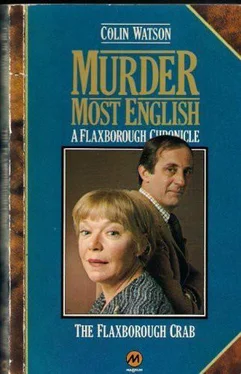“I’m very much afraid that there is nothing that I can impart. It is you who seem to have all the information. There have been two assaults recently. The sergeant downstairs will give you the details of those. But as far as the other things are concerned, it seems that you have a—what should I say?—a scoop. Congratulations.”
Henry stopped pacing and eyed Purbright speculatively. Then he nodded.
“Fair enough. Sergeant downstairs? Will do.”
He made for the door.
“Oh, by the way, Mr Popplewell...”
Henry turned.
“This soubriquet you say everybody is using. The Flaxborough Crab. I don’t quite get the significance.”
For answer, Henry took three or four lurching steps sideways, as if the floor had suddenly become the deck of a ship in heavy seas.
“Runs away like that. So they say.”
“Oh, I see. Thank you very much.”
“Don’t mensh.” Henry opened the door and gave a sprightly salute of farewell. “Chow!”
“Good morning,” said Purbright.
Chapter Four
Mr Harcourt Chubb, the chief constable, listened courteously to his inspector’s summary of the activities to date of the Flaxborough Crab.
He had adopted his inevitable audience-giving stance of leaning elegantly against the corner of the fireplace in his office while Purbright sat (at Mr Chubb’s insistence) on a rather low chair six feet away.
Purbright outlined the experiences of Miss Butters and Brenda Sweeting; then added the gleanings of the Flaxborough Citizen from the troubled fields of Edward Crescent, Windsor Close and Abdication Avenue.
“I’ve sent two men over to make inquiries in the area, sir. They have a few addresses. Mr Lintz, the editor of the Citizen , was kind enough to let me have a proof of the story that they’re running on Friday.”
The Chief Constable pursed his lips. “Mind you, Mr Purbright, I should be inclined to treat that sort of tiling with great reserve. Newspapers, you know...” He shook his head sadly.
Purbright was well aware of Mr Chubb’s distrust of the Press. Only two weeks previously, in its report of the annual Flaxborough Kennel Club Show, the Citizen had emasculated in print his prize-winning Yorkshire Terrier, ‘Six-shot Rufus of Swaledale’, by contriving to substitute its name for that of the Bitch with the Most Appealing Eyes.
“It does seem rather a pity,” Mr Chubb said, “that we have to get this sort of information at second hand, so to speak. I should have thought that it fell into the category of gossip.”
“We must not despise gossip if it proves useful, sir.”
“No, but don’t you think that this fellow might get tired of roaming around and making a nuisance of himself if he isn’t encouraged by a lot of fuss? I’ll have a word with Lintz, if you like. He owes me a favour.”
Purbright shook his head. “An editor would want a much better reason than that for suppressing a news item, if you don’t mind my saying so. I’m afraid he would tell you that facts are not private property, sir. And he would be right.”
The Chief Constable made a non-committal murmur and looked gravely wise.
“In any case,” Purbright went on, “I think it will be just as well if the public is put on its guard. This man may have given some pretty futile performances up to now, but I think he’s dangerous—potentially dangerous, at any rate. And if we can’t warn people, I’m sure you wouldn’t want to prevent the newspapers from doing so, sir.”
“Well, not if danger really exists, naturally.”
“I believe it does. That is why I expect you would like me to put as many men as possible on night patrol for a while.”
“I’m sure I can leave you to do what you consider best, Mr Purbright.”
“Thank you, sir.”
The inspector closed the folder he had been holding on his knee and stood up. He was a head taller than the Chief Constable.
Returning to his own office, he discussed with Sergeant Love the deployment of those nocturnal unfortunates whom Love was quick to dub his ‘Crab-catchers’. They agreed that there would be no point in dissipating such meagre resources by trying to cover places like Gorry Wood. Better to give what eye they could to the housing estates within the town boundaries, with special concern for whatever had been troubling the insomniac housewives of Abdication Avenue and its vicinity.
That night, two detectives and five constables gathered in the canteen to be briefed by the inspector.
The detectives looked their usual nondescript selves. The men from the uniformed branch, however, had responded to the instruction to appear in plain, dark clothes by donning their best Sunday suits. They made Purbright think of a bunch of mourners, fortifying themselves with mugs of cocoa before the journey to the cemetery.
After he had assigned them their areas of operation, the inspector told the men what little was known of the characteristics of the quarry. Related baldly, it sounded almost useless, and he noticed that several of his troop looked even more like mourners than they had before.
“Couldn’t we take some decoys with us, sir?”
This suggestion came from Constable Wilkinson, who rose and stood to attention while making it.
In the ensuing murmur of jocular approval could be distinguished such remarks as “Comforts for the troops’ and “Where’s Sadie Bellweather?”
“I think you’d better see what you can do on your own at this stage, gentlemen,” Purbright said. “I’m sorry you’ve so little to work on, but specific information is nearly always lacking in cases of this kind. Victims of sexual assault seldom make good witnesses, as you yourselves will doubtless have found...”
He paused, aware of a certain unfortunate ambiguity in his words, and added:
“But this time at least there seems to be general agreement on one feature—the very peculiar manner of running that your man adopts when challenged. I’m sure you will have no difficulty in recognizing it.
“There is just one hazard of which perhaps I ought to remind you before you leave. This man has been reported as varying his more violent activities with spells of window-watching in the areas you have been given to patrol. Now then, it is right and proper that you should watch for the watcher. That is part of your job. But you will, I am sure, be aware of the unfortunate impression that would be created—not least in the minds of vigilant husbands—if your solicitude were to be observed in turn.”
“What he means,” whispered Detective Pook to the stolid constable at his side, “is that you’re to keep your eyes off the cheesecake in the bathrooms, mate.”
The seven policemen took their final swigs of cocoa, nodded respectful farewells to the inspector, and filed out into the night. Their duty was to end at two o’clock in the morning, which Purbright and Love had decided between them to be a reasonable upper limit to the libidinous potentialities of even the Crab.
For the next four hours, each officer was to stroll as quietly as he was able up and down the streets of his allotted area, linger here and there in whatever concealed vantage points offered, traverse back lanes, peer into gardens and yards, avoid encounters, resist the lure of carelessly curtained windows, and stave off sleep.
It was not the most congenial assignment he could have wished.
Nor, in any instance, did it achieve its object.
The night’s only excitement fell to the lot of Constable Burke.
He had been given surveillance over a group of five interconnecting streets that formed the southern half of the Burton Lane council estate. The area was popularly, if now unjustly, known as ‘Bottle Hill’. This name had been bestowed in days when the place was garrisoned by families of quite remarkably bibulous and quarrelsome tendencies, but no more than three or four of these households had survived the twin ravages of feud and eviction order, and a comparatively conformist type of tenant was now in the majority.
Читать дальше












